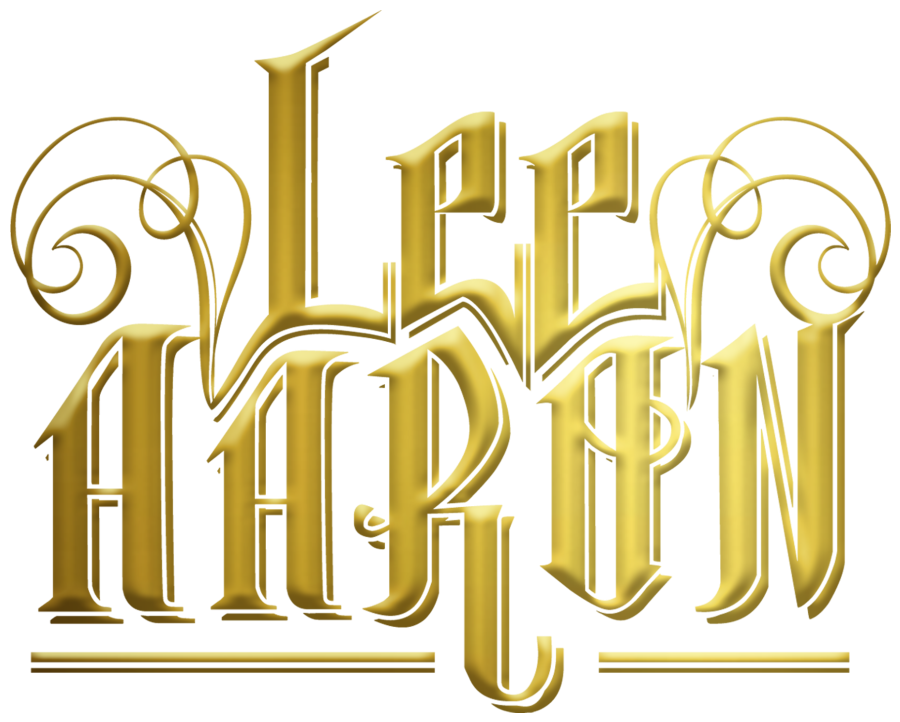Kevin Lamb is a Canadian-based photojournalist writing a book about behind-the-scenes happenings in the Canadian music industry from 1969 onward. This is the interview he did with Lee Aaron.
Kevin Lamb: Was there ever a moment where you watched someone playing live and you thought “that’s what I want to do”? Who were your inspirations to become a musician? Any Canadian influences?
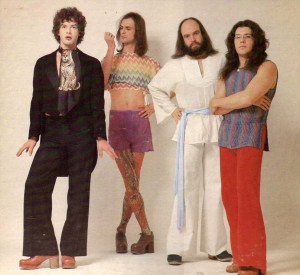
Lee Aaron: The first concert I ever saw was Max Webster. They played my high school when I was 16. I remember being blown away by how musical they were. The songs were crafted so well and the level of musicianship was astounding. Later that year Goddo played an all ages show at a local night club and I was allowed to go with friends. They were incredibly loud and powerful and I remember wondering, even as a teen, why aren’t there any women playing powerful music? Around the same time, my father brought home a bunch of vinyl albums he inherited that were being replaced by 8-track at the Humber College radio station. In that pile, I discovered Heart (Dreamboat Annie) and the very first Runaways LP. They resonated with me in a big way and started me down a different path. Then a friend gave me a copy of Led Zeppelin II a decade after its release in 1969. I was amazed. I’m still amazed at how fresh that recording sounds. Up until then I’d been singing Broadway standards in musical theatre.
Kevin: Do you remember the first time that you took the stage in front of people? What was that experience like? What lessons, if any, did you take away from that night?
Lee: The first time I ever sang in front of people I was five. My mother said my rehearsing sounded awful, but my performance in the Christmas play was fantastic. I remember feeling a lot of joy when people responded positively. Joy for me and for them. I still feel that way when I perform.
Kevin: I would assume that becoming a full-time musician, and making a career of it, would take a large leap of faith. What was your situation like when it came time to make that choice?
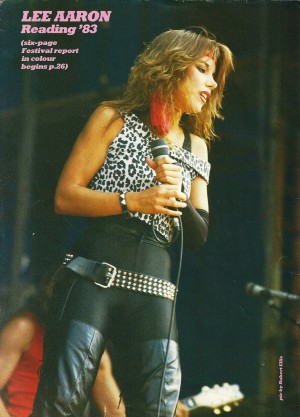
Lee: Well, there wasn’t really any leap of faith involved for me. I was 17 years old and quite naïve when I was discovered by my first manager. I wasn’t leaving anything behind except for a couple of scholarships to college. I agreed with my parents to give it 2 years and if things weren’t going well I’d return to school. Within a couple of years, I’d made my first album, had travelled overseas, was written about in rock magazines and was touring. College seemed far less exciting than the life I was leading at the time so I continued to make music. Some times were leaner than others and the road was a rocky one at times, but you continue because you love your craft. Money wasn’t the main thing in the least for me. You end up with an entourage of people making a living off you anyway if you are successful, and I experienced that too, later on.
Kevin: You were taking a risk to pursue your dream of playing music. What was your biggest fear?
Lee: My biggest fear was that I may not be respected. And of course, that happened, but you realize eventually that not everyone is going to like you, and some people may even despise you. And the fans that love you build you up to be something you could never live up to. It’s a pretty fake world, really, and if you don’t maintain some balance you are in trouble.
Kevin: Have you ever had a bad experience with stage fright? How did you handle it? Do you still get it?
Lee: Only when I knew that important people – like record execs – were in the audience. I found that really intimidating. I never got used to the idea of some bigwig out there taking notes on my performance. Of course nowadays, there aren’t really any bigwigs left.
Kevin: How do you prepare yourself prior to walking out on stage?
Lee: These days, I hang out with my band, joke around, sing some warm ups and just go out there with the attitude that each audience is different and unique and anything can happen. I don’t have an ‘etched in stone’ set list or tell the same stories between songs each night. I like to let the night be interactive with room for spontaneity; some nights we’ve had some pretty hysterical things happen. Last Hallowe’en, for instance, both Elvis and Lady Gaga were there. You can get a lot of mileage out of things like that….
Kevin: A set list: It sounds like a simple thing, but is there a lot of thought that goes into arranging a set of music?
Lee: Yes! You need to make sure the keys and rhythms segue smoothly and you make a strong opening impression and closing impression. People deserve to leave feeling like they’ve had a real experience with you. The order in which you arrange your songs helps this.
Kevin: On your first cross-country tour, what were some of the hardships that you had to get used to? And how did you deal with it?
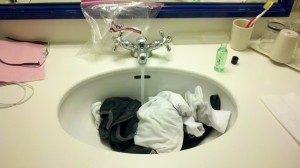
Lee: Oh wow, my first few tours were brutal! Hours of driving in vans with no suspension, washing out socks and undies in the sink and wearing flip-flops in the communal shower because things were growing in there. Gaffer-taping cardboard over broken windows in winter so you wouldn’t freeze to death and living on Kraft Dinner and peanut butter sandwiches because we were so incredibly broke. I think everyone cut their teeth in the northern Canadian hotel bar circuit. Being a girl was hard because I was so young and I felt like I had no one there to protect me. I was forced to toughen up quite a bit.
Kevin: Touring and road life back in the 1980s compared to today, how has it changed?
Lee: Well, at one point I traveled with a couple of semi trailers full of equipment and lighting, tour bus, etc. and had a personal (female) assistant on tour with me. I was also supporting a full road/stage crew, band, agent, manager, lawyer and record company. Those were the times. These days, we travel light, just my band, me, our guitars, maybe a sound technician. Full production is provided in all my contracts. I actually prefer it this way. I’m tethered to fewer things.
Kevin: Playing live shows for a long time now, have there been any physical tolls? How do you deal with things like that on a tour?
Lee: I have some hearing loss in my left ear but nothing else. I’m very fortunate to still have my voice and be in pretty good shape. I have to hit the gym now though. My workout used to be on stage every night, but I do far fewer shows since becoming a parent. I used to tour perpetually and now it’s only a few isolated blocks of shows per year. I need to prepare to go out now, whereas I used to be on top of my game all the time in the past.
Kevin: As a non-musician I’m trying to grasp what it’s like to stand on a stage and play to a crowd of people. Is there a way to describe the emotions and feelings that you get in front of a crowd? What do you get out of it?
Lee: When people are connecting with your music and the experience of performing it becomes transcendent, it is pure joy. I would have to say that I still get a lot of joy out of it.
Kevin: In regards to touring: Do you have a great story or two that seems to get told a lot?
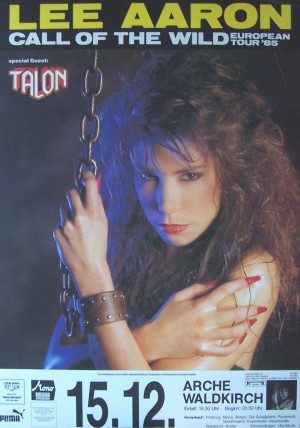 Lee: In the fall of 1985 we were on tour throughout Europe on the success of the Call of The Wild album on a small label called Roadrunner Records. The promoter had asked us to take the opening act, a German power trio called TALON, on our tour bus for the show in West Berlin. At the time, the Berlin Wall was still in existence, and there were only a couple of autobahns that permitted travel between East and West Germany. Each border crossing had check stations with armed soldiers, machine gun towers and tire puncturing grates to stop any defectors. If, when checking in at the other side, your trip took too long, you were grilled on your activities while inside the Iron Curtain. Too short a trip merited a speeding fine. It was all a bit unnerving so all paperwork needed to be in order. Contraband or any prescription drugs that weren’t clearly recognizable were strictly verboten.
Lee: In the fall of 1985 we were on tour throughout Europe on the success of the Call of The Wild album on a small label called Roadrunner Records. The promoter had asked us to take the opening act, a German power trio called TALON, on our tour bus for the show in West Berlin. At the time, the Berlin Wall was still in existence, and there were only a couple of autobahns that permitted travel between East and West Germany. Each border crossing had check stations with armed soldiers, machine gun towers and tire puncturing grates to stop any defectors. If, when checking in at the other side, your trip took too long, you were grilled on your activities while inside the Iron Curtain. Too short a trip merited a speeding fine. It was all a bit unnerving so all paperwork needed to be in order. Contraband or any prescription drugs that weren’t clearly recognizable were strictly verboten.
The show in Berlin went fantastic. Now off to Bremen for the next show. The problem occurred the next day when the bass player in the opening act pointed out that we were clearly driving in the wrong direction on the restricted autobahn. In fact we’d been driving the wrong way for about 2 hours. We, being stupid westerners, had no clue. We’d already had a week’s worth of bad experiences with this particular bus driver (Habib) – who spoke neither German nor English – and it wasn’t the first time he’d gotten us lost. Only this time it was more critical as we had no other option except to turn around and drive back through Berlin and start heading NW on the permitted route. This would add at least 4 hours to our trip, cause us to miss our sound check, possibly be late for the show, not to mention explaining to the border police at checkpoint Alpha our whereabouts during this time lost and why we had extra Germans onboard for the trip. Our tour manager, Bruce, was livid and started cursing at Habib in French. Habib, who spoke Arabic, also spoke some conversational French and this had been their fragmented way of communicating all week. I just remember freaking out at Bruce who in turn freaked out at Habib, who in turn freaked out completely because he knew this was the final straw that would end his bus driving career. It was a flurry of stress and yelling when all of a sudden Habib just reefed on the steering wheel and pulled off at a random exit and started driving through rural Easy Germany. By this time the promoter had woken up and started freaking out in German at the driver. The guys in the opening act started to panic, convinced they were all ending up in some East German prison by the end of the day. Clearly, we were not supposed to be here and while there may be lenience for westerners, a wall was built to separate these folks from our guests on board. We drove through a few small towns and noticed a guard or two with rifles make phone calls from grey land phones on nearby poles but weren’t certain they are about us: the big, shiny, beautiful new tour bus cruising through the monochromatic landscape of the Eastern Bloc. The bass player said a lot of ‘Hail Marys’ on that ride.
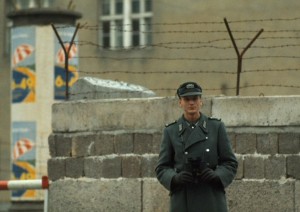 After much zig-zagging through the East German countryside, Habib eventually connected us back to the correct autobahn and made our way to checkpoint Alpha. The East German officer that got on our bus couldn’t have been more than about 24. He started to question us about why our trip had taken so long, like he had something to prove. The promoter, Reiner, broke down, near tears, telling him about our nerve-racking excursion, getting lost and ending up back here. He softened and offered to let us go, no questions, as long as we gave him a Lee Aaron T-shirt, which he gleefully proceeded, in stealth-like fashion, to stuff down his pants. The young officer could have gotten in quite a bit of trouble for this, but it saved our necks at the time.
After much zig-zagging through the East German countryside, Habib eventually connected us back to the correct autobahn and made our way to checkpoint Alpha. The East German officer that got on our bus couldn’t have been more than about 24. He started to question us about why our trip had taken so long, like he had something to prove. The promoter, Reiner, broke down, near tears, telling him about our nerve-racking excursion, getting lost and ending up back here. He softened and offered to let us go, no questions, as long as we gave him a Lee Aaron T-shirt, which he gleefully proceeded, in stealth-like fashion, to stuff down his pants. The young officer could have gotten in quite a bit of trouble for this, but it saved our necks at the time.
In the end, we missed our sound check but made the show and Habib was replaced the very next day by Wolfgang … but that’s a whole other story.
